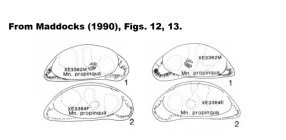WoRMS taxon details
Macrocyprina propinqua Triebel, 1960
460304 (urn:lsid:marinespecies.org:taxname:460304)
accepted
Species
marine, fresh, terrestrial
recent only
Triebel, E. (1960). Die taxionomische Stellung und die Gattungen der Unterfamilie Macrocypridinae (Ostracoda). <em>Senckenbergiana Biologica.</em> 41, 109-124. [details]
Type locality contained in Bonaire part of the Caribbean Sea
type locality contained in Bonaire part of the Caribbean Sea [details]
Etymology "Name: From propinquus, related; because of the resemblance to Macrocypris maculata (BRADY 1866)." free translation from...
Etymology "Name: From propinquus, related; because of the resemblance to Macrocypris maculata (BRADY 1866)." free translation from theGerman to English. [details]
Brandão, S.N.; Antonietto, L.S; Nery, D.G.; Pereira, J.S.; Praxedes, R.A.; Santos, S.G.; Karanovic, I. (2024). World Ostracoda Database. Macrocyprina propinqua Triebel, 1960. Accessed through: World Register of Marine Species at: https://www.marinespecies.org/aphia.php?p=taxdetails&id=460304 on 2024-11-21
Date
action
by
![]() The webpage text is licensed under a Creative Commons Attribution 4.0 License
The webpage text is licensed under a Creative Commons Attribution 4.0 License
original description
Triebel, E. (1960). Die taxionomische Stellung und die Gattungen der Unterfamilie Macrocypridinae (Ostracoda). <em>Senckenbergiana Biologica.</em> 41, 109-124. [details]
 Present
Present  Present in aphia/obis/gbif/idigbio
Present in aphia/obis/gbif/idigbio  Inaccurate
Inaccurate  Introduced: alien
Introduced: alien  Containing type locality
Containing type locality
From editor or global species database
Diagnosis "Carapace very small, ovate-oblong in lateral view; dorsal margin broadly and gently arched; anterior margin broadly rounded and slightly truncate; ventral margin with rather shallow ventral indentation, not up-swung posteriorly, broadly rounded posterior angle of about 50º; zone of concrescence broad, vestibules correspondingly restricted.Male fifth limbs very asymmetrical; right limb with sinuate podomere II, just one elongate peg, one very long dorsal seta, and a short, right-angled, tapering distal hook recurved at 85'; left limb with slender podomere II, one acutely pointed peg, a long dorsal seta, and a tiny, nearly straight, acutely pointed distal hook curved at 158°. Fe- male fifth limb slender with slender terminal claws. Sixth limb with dorsodistal claw nearly as long as mediodistal claw. Recurved seta of seventh limb with very tiny hairs and spatulate distal tip. Furcae long, slender, gracefully tapering, curved, with small proximal setae. Hemipenis crescent-shaped, with straight dorsal margin, obliquely arcuate, convex ventral margin, and bluntly rounded anterodorsal margin, and with additional lobate anterodorsal accessory lamella; copulatory rod short, straight. Zenker's organ with small terminal bulb; vas deferens arranged in three loose loops as long as the Zenker's organ." (Maddocks, 1990: 110) [details]
Dimensions Length: female 1,02-1,08mm, male 0,95-1,00mm. (Triebel, 1960) [details]
Etymology "Name: From propinquus, related; because of the resemblance to Macrocypris maculata (BRADY 1866)." free translation from theGerman to English. [details]


